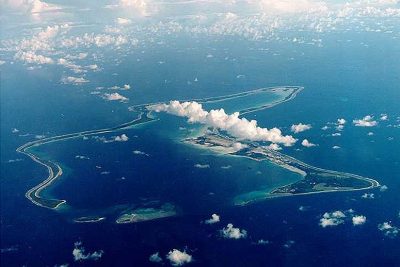Getting Rid of Imperial Ambitions. UN Resolution to Terminate British Control over Chagos Archipelago
London is not going to return the Chagos Archipelago to Mauritius

The British authorities cannot get rid of imperial ambitions and appear to be yearningly recalling the times of the British Empire under Queen Victoria. At least, this is what the Chagos Archipelago situation testifies to.
Just a reminder: on May 22 this year, the UN General Assembly by a majority vote adopted a resolution to terminate British control over the Chagos Archipelago in the Indian ocean and to transfer it to the rightful owner – Mauritius. 116 countries, including Russia, favored the document, with only six (including Britain and the United States) votes against and 56 abstentions. In compliance with the act, the United Kingdom is obliged to stop controlling the Chagos Archipelago within six months. See this.
But it will unlikely happen that soon, as confirmed by the reaction of British Ambassador to the UN Karen Pierce, who pushed back against the UN General Assembly resolution. Following the meeting, she told reporters about being disappointed by the voting results. “This is a bilateral matter; submitting it to the General Assembly creates a sad precedent,” the diplomat stated. The British Foreign Office was fully supportive of Pierce’s stance, saying that London does not recognize Mauritius’ claim to sovereignty over the Chagos Archipelago and expresses regret over this issue being discussed within the UN.
One could not expect a different reaction from official London – the United Kingdom’s present-day foreign policy is all about trying to prove that it still has certain influence and weight in the international arena. And the situation involving the Chagos Archipelago is the very case, as London believes, to prove its relevance globally.
Here it is appropriate to apply to the history of the issue. In 1965, Britain illegally separated the Chagos Archipelago from the rest of Mauritius, being a British colony back in those days. Mauritius itself gained independence three years later, but Chagos remained part of the British territory. In 1966, the United States rented Diego Garcia, the largest island of the archipelago, to build a military base there. At the same time, all the 1.5 thousand archipelago dwellers were deported. For many years, the former Chagos inhabitants have been crying for the right to return. However, in 2016, the British Foreign Office extended the lease treaty with the United States until 2036 and said the expelled islanders would not get the right to return home.
The sufferings of the expelled indigenous people of Chagos – the Îlois – seemed to have no end in sight. However, on February 25, 2019, the International Court of Justice in the Hague delivered a verdict that the UK should turn over control of the Chagos Archipelago to Mauritius. Notably, “as soon as possible.” The resolution was nearly unanimous: 13 judges favoring the decision were opposed by a single representative of the USA. After that, it seemed that the decade-long territorial dispute should have been finally resolved. But it was not to be. Britain replied that it would study the decree carefully, which actually means “the islands were and will remain ours”. And finally, the UN General Assembly issued a resolution of May 22 this year on the transfer of Chagos to Mauritius and the repatriation of indigenous people to the archipelago. And once again, London reacted adversely to the UN document.
Britain’s response to the Hague court decisions and the UN General Assembly resolution is indicative in several respects. First, it has once again demonstrated the arbitrariness of interpretations made by the West, including Britain, of international organizations’ laws and decisions, among others the UN. Secondly, it serves as another reminder that the sad practice of forced displacement of peoples and ethnic groups (which the West has got used to grievously accuse Russia of, demanding repentance) has been common practice for the twentieth century.
It is reasonable to ask why London is so persistent in the issue of transferring Chagos to Mauritius and bringing the indigenous people back to the archipelago? The answer is out in the open, as they put it. First, the maritime zone around Chagos, declared exceptional by London and accounting for over 500 thousand square kilometers, which is twice the size of the UK itself, is of acute economic importance. Secondly, the Diego Garcia island hosts one of the United States’ largest and most secret overseas military bases. Britain, incidentally, shares some of the archipelago military facilities with the US.
Considering the strategic importance of these islands, allowing Britain and the United States control almost the entire Indian ocean, it becomes clear why disputes around the Chagos archipelago reach the highest international level every once in a while and have not been resolved as yet.
Apparently, despite decisions by the International Court of Justice in the Hague and the UN General Assembly resolution, that have nevertheless become a sensitive political and diplomatic defeat for London and Washington, Chagos will remain British in the foreseeable future. At least as long as the British crown needs the archipelago “for safety reasons”, as London states. Translated from the diplomatic language this means “until the Americans decide that they no longer need the Diego Garcia military base.” And this, almost certainly, is never going to happen.
*
Note to readers: please click the share buttons above or below. Forward this article to your email lists. Crosspost on your blog site, internet forums. etc.
This article was originally published on InfoBrics.
Sergey Sayenko is an international observer.

